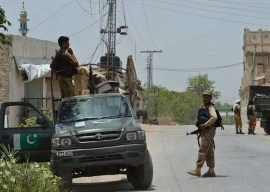
In a bid to prepare consumers for paying a high price for gas to be imported from Iran, the Ministry of Petroleum and Natural Resources has sent a summary to Prime Minister Yousaf Raza Gilani, seeking approval for price increases of 15 to 96 per cent.
The price for imported gas will be Rs1,800 per million British thermal unit (mmbtu) against wellhead gas price of Rs464 produced domestically.
The ministry has also sought approval for imposing a ban on bulk meter connections to housing colonies. Bulk meters will be gradually replaced with standalone meters at separate premises.
Though the Economic Coordination Committee (ECC), in its recent meeting, approved the proposed gas price increase, it directed the petroleum ministry to seek a final nod from the prime minister.
“The price of gas to be imported from Iran stands at Rs1,800 per mmbtu and Liquefied Natural Gas (LNG) will cost the same,” Petroleum Minister Dr Asim Hussain said while talking to the media on Saturday.
According to the summary, the petroleum ministry has proposed increase of 15 per cent in gas price for domestic consumers including bulk consumers, commercial, cement and power plants of Water and Power Development Authority (Wapda) and Karachi Electric Supply Company (KESC).
An 18.43 per cent increase has been recommended for the industrial gas consumers including textile industry and captive power plants to bring gas prices for these sectors in line with those for Wapda and KESC.
The ministry has sought an increase of 36.26 per cent in gas tariff for independent power producers (IPPs) to bring it at the same rate as that for Wapda and KESC. For compressed natural gas (CNG) stations, an increase of 69.06 per cent in gas tariff has been sought to take the consumer price for CNG to 65 per cent of petrol price.
For fertiliser plants, the ministry has proposed an increase of 96 per cent in the price of gas to be used as feedstock by old plants in a bid to gradually eliminate subsidy.
The petroleum minister said wellhead price of domestic gas was Rs464 per mmbtu ($4 to $5) and some consumers were paying more and some less, which was adding to the inter-corporate debt. “There is distortion in prices and we are correcting it,” he said.
“If there is no rationalisation, who will buy the (expensive) imported gas,” he said, adding there should be a weighted average gas price in future. He said all sectors including CNG, fertiliser, domestic and textile were vying to get gas supply.
Companies quit due to low gas prices
Hussain said oil and gas exploration companies were leaving the country due to low wellhead gas prices and cited the names of Malaysia’s Petronas and British Petroleum (BP), which had pulled out of the country.
“BP has not left those countries where it has attractive incentives but wrapped up operations in Pakistan due to the low price,” he said, adding the petroleum ministry would announce Exploration and Production Policy 2011 next month to give better incentives. “Local lords” were creating hurdles in the way of drilling operations of exploration companies, he said.
“Investment in exploration dwindled also due to the 18th constitutional amendment and now the law ministry says we will be the executive authority,” he said, adding “we are also conducting a study to cancel licences of those exploration companies which had not started work on awarded blocks for a long time.”
He said the petroleum ministry had recommended passing on full impact of reduction in oil prices to the consumers, but the finance ministry adjusted it in petroleum levy to create fiscal space.
Published in The Express Tribune, July 3rd, 2011.










































COMMENTS (6)
Comments are moderated and generally will be posted if they are on-topic and not abusive.
For more information, please see our Comments FAQ